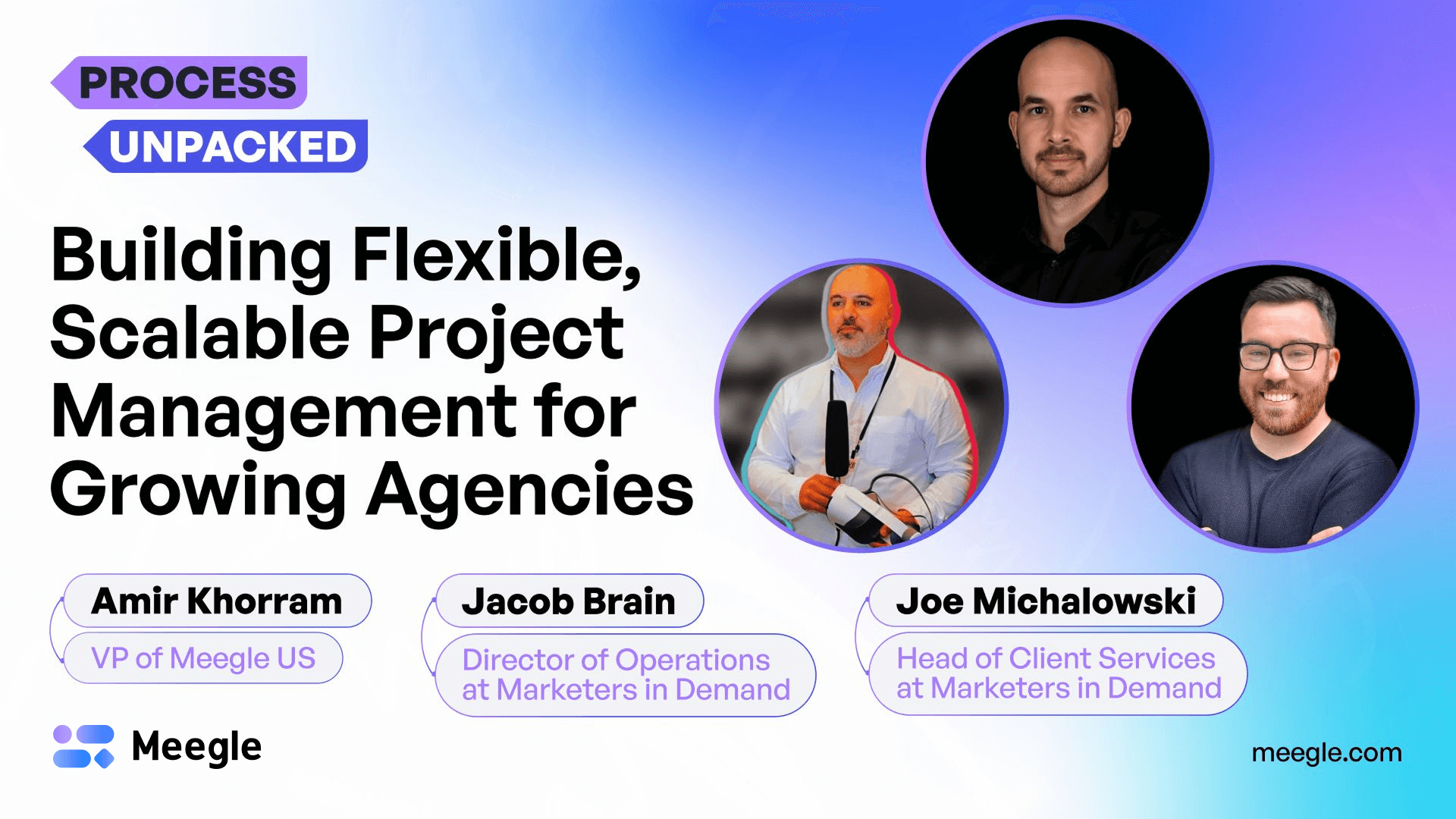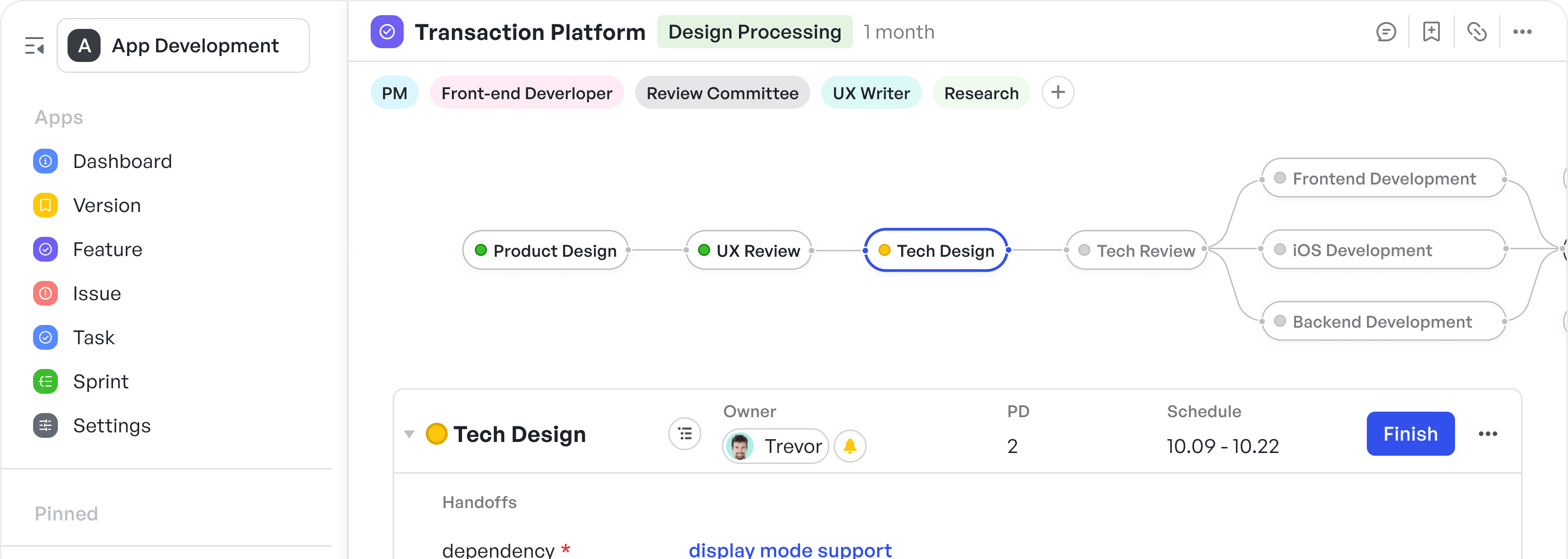Episode Summary
In this inaugural episode of Process Unpacked, host Amir Khorram sits down with Joe Michalowski, Head of Client Services, and Jacob Brain, Director of Operations, from Marketers in Demand. Together, they discuss the complexities of managing multiple marketing agencies under one roof, highlighting the importance of unified project management systems. They share how their approach fosters seamless collaboration across teams while maintaining adaptability to meet client demands.
Jacob delves into the operational side, explaining how principles, rather than rigid rules, drive their project management philosophy. He shares insights on building scalable systems that simplify onboarding, streamline workflows, and improve team alignment. Joe complements this by emphasizing the value of listening to clients’ unique needs and using data-driven decision-making to design tailored solutions that deliver real results.
From navigating tool integrations to addressing the challenges of scaling operations, this episode offers actionable strategies for optimizing project management in dynamic environments.
Guest-at-a-Glance
Name: Jacob Brain
What they do: Director of Operations
Company: Marketers in Demand
Noteworthy: With nearly a decade of experience, Jacob excels at designing scalable systems, refining project management processes, and ensuring operational efficiency across agencies.
Name: Joe Michalowski
What they do: Head of Client Services
Company: Marketers in Demand
Noteworthy: A client-focused leader, Joe bridges the gap between client needs and internal operations, leveraging tailored systems to enhance collaboration and client satisfaction.
Watch the Full Videoloading...
loading...
Key Insights
Scaling Agencies with Unified Project Management
Jacob Brain and Joe Michalowski discuss how Marketers in Demand uses a unified project management framework to manage multiple agencies under one roof. By creating a flexible yet standardized system, they ensure all teams align around shared principles while maintaining adaptability for agency-specific needs. Jacob explains how their six-step process provides consistency and scalability, while Joe highlights the importance of bridging client communication with internal operations. Their approach fosters collaboration, reduces inefficiencies, and simplifies onboarding for new team members and agencies, helping them scale effectively without compromising quality.
Principles Over Rules: The Key to Scalable Systems
Jacob emphasizes the importance of principles-driven project management over rigid rules. This approach allows their team to adapt workflows to unique scenarios without losing consistency or efficiency. Jacob and Joe explain how principles like “no overdue tasks” and data-driven accountability are baked into their systems, creating a flexible structure that accommodates diverse agency needs. They discuss how focusing on outcomes rather than prescriptive rules fosters innovation and ensures their processes are adaptable for future growth. This principles-based methodology empowers their teams to onboard new agencies, refine workflows, and maintain alignment across departments with minimal friction.
Integration Done Right: Balancing Automation and Client Needs
Effective tool integrations are critical to Marketers in Demand’s project management success. Jacob highlights how automations minimize manual tasks, streamline communication, and improve accountability. One standout example is a client portal that reflects their internal systems, providing transparency while ensuring internal operations remain clean and organized. The team’s philosophy prioritizes building systems to support business processes rather than forcing processes into rigid technology constraints. Joe complements this by stressing the importance of understanding client goals before implementing integrations, ensuring solutions are tailored to actual needs. This balance between flexibility and structure ensures tools enhance, rather than hinder, collaboration.
The Power of Iteration in Project Management
Jacob and Joe discuss how iteration is essential for refining project management processes and tools. They emphasize the importance of starting small, gathering feedback, and continuously improving workflows to address real-world challenges. For example, when rolling out new systems, they first test processes manually before automating them, ensuring clarity and efficiency. Joe highlights how team input is critical in identifying bottlenecks and tailoring solutions to actual needs. This iterative approach not only improves operational efficiency but also creates a culture of adaptability, enabling the team to respond swiftly to changes in client demands or agency growth. By prioritizing iteration, Marketers in Demand ensures their project management systems remain effective and scalable over time.
Episode Highlights
Building Unified Philosophies for Agency Operations
Timestamp: [00:16:00]
Jacob explains how Marketers in Demand aligns multiple agencies by creating a unified operational philosophy. This ensures consistency across teams while allowing flexibility for individual agency needs. He introduces the metaphor of a house with multiple doors, representing each agency under their umbrella, all accessing the same integrated project management systems. Joe emphasizes how this shared structure prevents siloed operations and fosters collaboration among teams, helping them deliver better results for clients.
“We can’t have everybody off doing different things. Once you’re in the house, you have access to all of these different rooms. Everyone needs to be in the same place for us to grow.”
Adapting Project Management for Distinct Agency Functions
Timestamp: [00:18:00]
The discussion focuses on tailoring project management processes to fit the unique focus of each agency under the Marketers in Demand umbrella. Jacob explains how their six-step framework accommodates diverse needs by allowing agencies to enter the process at different stages while still adhering to the overall structure. This ensures all work is guided by shared principles, even as specific needs vary. Joe underscores the importance of maintaining consistency across deliverables, which prevents misalignment and inefficiencies.
“Whether it’s a content plan or a strategy document, the philosophy remains the same. Everything flows together, so no content sits in a corner disconnected from the rest of the work.”
Solving Complex Challenges with Principle-Based Systems
Timestamp: [00:21:00]
Joe and Jacob discuss the importance of principle-based systems in solving operational challenges. They share how adhering to foundational principles, such as flexibility and accountability, allows them to address diverse client needs without rigid rules. Jacob emphasizes the power of outcome-oriented processes, where results—like eliminating overdue tasks—guide decision-making. Joe shares how this approach simplifies onboarding and problem-solving across different teams.
“We put these guardrails in place. No matter the project, this principle applies. Adapt it for the specific situation, but ensure it meets the larger goal.”
Insights from Iterative Onboarding and Training Processes
Timestamp: [00:46:00]
Jacob and Joe explore how their iterative approach to onboarding improves alignment and operational efficiency. Instead of overwhelming new hires with information, they combine asynchronous training videos with hands-on project work to provide practical experience. Jacob describes their recent focus on cross-role training, where employees try tasks outside their usual expertise to build empathy and improve collaboration. Joe highlights the value of providing training “just in time,” ensuring employees learn and apply concepts directly within their workflow.
“We’ve moved from talking at people during onboarding to giving them hands-on projects. It’s no longer, ‘I hope you remember this three months later.’ It’s right there when they need it.”
Top Quotes
- [00:16:00] Jacob Brain: "We can’t have everybody off doing different things. Once you’re in the house, you have access to all of these different rooms. Everyone needs to be in the same place for us to grow."
- [00:18:00] Joe Michalowski: "Whether it’s a content plan or a strategy document, the philosophy remains the same. Everything flows together, so no content sits in a corner disconnected from the rest of the work."
- [00:21:00] Jacob Brain: "We put these guardrails in place. No matter what you’re doing, this principle applies. You adapt the principle for the specific project, but it ensures the whole team stays aligned and efficient."
- [00:31:00] Jacob Brain: "We built a portal over our project management system so clients can see updates directly. It increases accountability because if our systems are a mess, the client will see that."
- [00:46:00] Joe Michalowski: "We’ve moved from talking at people during onboarding to giving them hands-on projects. It’s no longer, ‘I hope you remember this three months later.’ It’s right there when they need it."
- [00:50:00] Jacob Brain: "Give me a strong API and good webhooks, and I don’t even need to log into a platform. I want systems to support our processes, not the other way around."







